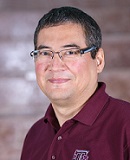
Plenary Lecture
Green Heterogeneous Wireless Networks

Professor Erchin Serpedin
Texas A&M University
USA
E-mail: eserpedin@tamu.edu
Abstract: This talk focuses on the emerging research topic “green (energy efficient) wireless networks” that has drawn huge attention recently from both academia and industry. In literature, various solutions have been proposed to enable efficient energy usage in wireless networks, and these approaches are referred to as green wireless communications and networking. This talk will focus on energy efficient techniques in base stations (BSs) and mobile terminals (MTs) as they constitute the major sources of energy consumption in wireless access networks, from the operator and user perspectives. This talk targets also the heterogeneous nature of the wireless communication medium. The wireless communication medium has become a heterogeneous environment with overlapped coverages due to the co-existence of different cells (macro, micro, pico, and femto), networks (cellular networks, wireless local areas networks, wireless metropolitan area networks), and technologies (radio frequency, device-to-device (D2D), and visible light communications (VLC)). In such a networking environment, MTs are equipped with multiple radio interfaces. Through multi-homing capability, an MT can maintain multiple simultaneous associations with different networks. Besides enhancing the achieved data rate through bandwidth aggregation, the heterogeneous wireless medium along with the multi-homing service can enhance energy efficiency of network operators and mobile users. This talk mainly focuses on promoting energy efficiency in wireless networks through multi-homing resource allocation, exploiting network cooperation, integrating different and new network technologies (radio frequency and VLC), and integrating new device centric communication paradigms such as Ds2D communications.
Brief Biography of the Speaker: Erchin Serpedin received the specialization degree in signal processing and transmission of information from Ecole Superieure D’Electricite (SUPELEC), Paris, France, in 1992, the M.Sc. degree from the Georgia Institute of Technology, Atlanta, in 1992, and the Ph.D. degree in electrical engineering from the University of Virginia, Charlottesville, in January 1999. He is currently a professor in the Department of Electrical and Computer Engineering at Texas AM University, College Station. He is the author of 3 research monographs, 1 textbook, 140 journal papers and 250 conference papers, and serves currently as associate editor for the IEEE Signal Processing Magazine and as editor-in-chief of EURASIP Journal on Bioinformatics and Systems Biology, an online journal edited by Springer-Nature. He served as associate editor for a dozen of journals such as IEEE Transactions on Signal Processing, IEEE Transactions on Communications, IEEE Transactions on Information Theory, Signal Processing (Elsevier), EURASIP Journal on Advances in Signal Processing, Physical Communication (Elsevier), and IEEE Signal Processing Letters. His research interests include signal processing, wireless communications, bioinformatics, and machine learning. He is an IEEE Fellow.